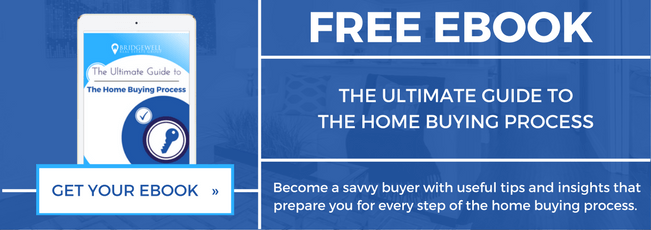Home Buying Tips
Our Top 10 Tips for a Successful Home Purchase
The real estate process can seem daunting, especially if you’re a first time home buyer, and it’s our mission at Bridgewell Real Estate Group to ensure that our buyers never have an ‘I wish I knew this…’ or a ‘I wish I did this…’ moment that could have been avoided. So with that being said, we decided to compile a list of our top home buying tips that we believe everyone should know before they decide to purchase a home. From the financing and pre-approval process to offer presentations, this blog covers it all!
Here are our Top home buying Tips broken down in to sections to get you ready for purchasing your next home:
Financing Tips:
Tip #1: Get pre-approved before you start looking
One of the most important parts of the home buying process is making sure you know what you can afford comfortably. Having your pre-approval done prior to looking for a home will give you an accurate guide for what you can afford, and what price range to begin looking in. Another advantage to having a pre-approval is locking in your interest rate for 3-4 months. You’ll be required to provide your mortgage professional with documents related to your income, credit score, and more so that when the time comes that you have an accepted offer the process of removing the financing subject will be much quicker as they’ll just need to qualify the home.
Real-Life Scenario: You begin to look for a home, find something you want but then find out you can’t afford it. Now you may be discouraged due to having to settle for something less and all the time wasted.
Tip #2: Don’t buy that car
Keep your money where it is, and don’t buy that car, or start a big lease, or start moving your money around all over the place. It might seem like a pretty straight forward and common sense tip, but we see it happen all the time.
Real-Life Scenario: A lender will pre-approve you but then you go and change everything and all of a sudden your affordability changes with it so your purchasing power is decreased when it comes to the mortgage commitment letter.
Tip #3: Try to avoid your absolute maximum budget
Stay mindful of your budget, because you likely won’t want to be eating kraft dinner for the next decade because you chose to max out the highest amount of mortgage that the lender would give you so that you could buy the biggest house on the block. Try to avoid your max budget at all costs, and start building a ‘rainy day’ fund for unexpected repairs, maintenance, property taxes, and more.
Real-Life Scenario: You find your dream home but it’s at your absolute maximum budget. You remove subjects, and then interest rate goes up half a percentage. You were already just squeezing by, and now you can barely afford to put food on the table. You got your dream home, but you’ve sacrificed your lifestyle and now with the interest rate rise you’ve gone over budget.
Tip #4: Don’t forget closing costs & sleeper costs
During the pre-approval process the mortgage broker will want to see that you have money to pay closing costs such as lawyer fees, property tax adjustments, maintenance fee adjustments, and property transfer tax. Sleeper costs are the regular costs that you might just not think about right off the bat – maintenance fees, property taxes, hydro, gas… it’s not just about your mortgage payment. This is another reason to avoid the maximum amount the lender will give you, because you’ll want to be prepared to live ‘comfortably’ with all costs involved with being a homeowner.
Real-Life Scenario: You got an accepted offer, you removed subjects, but you forgot about property transfer taxes. (PTT) It’s a week before the completion day, and you realize that you need an extra $6,000 for PTT that you don’t have.
Offer & Real Estate Market Tips:
Tip #5: Define asking price vs selling price
Asking price [listing price] and selling price are two very different things in real estate. Just because the seller has listed the property for $499,000 doesn’t mean that it will sell for that price. It’s important that you’re working with a realtor who understands how to estimate market value of a property, as that will ultimately be the closest estimate for the selling price. The listing price is just a strategy decided on by the seller, they may list for below, above, or at market value. Related article: How to Determine Market Value
Real-Life Scenario: You continue to only write offers based around the listing price. After a few months of putting in offers and not winning, you regret not going all-in closer to market value to some of those dream homes because the market value has increased since then. Now you are not able to find something that was just as good as those previous homes and have a “one that got away” result.
Tip #6: Have your deposit ready to go
Your deposit will typically be due within 24 hours of subject removal, unless otherwise stated on the contract. If your money is in a RRSP, make sure to submit the accepted offer to your bank right away as it can take up to 5 business days to get the money out. If it’s in a TFSA make sure you allow 2 business days minimum. It is best to have the money in a chequing or savings account, something liquid, so that you can have the deposit ready without any hassle or complications when you remove subjects. For more information on how the deposit timeline works, check out this related article: Deposits in Real Estate 101
Real-Life Scenario: You get your accepted offer for your dream home and are ready to remove subjects being happy with everything that has been done during the subject removal period. You find out that the bank you have your deposit money in will not be able to get your money transferred in time due to company policies. You are now forced to collapse the deal and risk having another buyer take that home.
Tip #7: Expect during the inspection
You should always expect something to come up in an inspection report. If the inspector comes up with a blank report, then they’re not doing their job. The report is there to anticipate maintenance and repair costs over a period of time, as well as determine what needs to be done now or in the immediate future. There will always be something and it’s important that you expect that to avoid disappointment. Buying a home is not just a simple purchase, it’s a lifestyle that includes long term care, maintenance, and repairs and you should be prepared to take on that responsibility when purchasing. For more information on inspections, check out this related article: Inspection FAQ’s
Real-Life Scenario: You collapse an offer and decide to look for something at a slightly higher price point to avoid those same issues. Once you have an accepted offer with a slightly newer home, you find out they too have the same amount of repairs needed or more. Depending on how long it took to get your next accepted offer, market value could have gone up or you’re paying for more with the same concerning inspection report.
Home Search Tips:
Tip #8: Get to know the neighbours [and the neighbourhood]
You’ll want to do some research on the neighbourhood that you’re thinking about buying, and with that comes research on the neighbours! Door knock and introduce yourself, check to see if the neighbours have an opinion on the house or the area. Try driving from the property to your work and see how long it takes. Check out the demographics and neighbourhood info online. You’re taking on a lifestyle when you move so make sure that you fully understand what that lifestyle entails!
Real-Life Scenario: You purchase a new home only to realize that you’re really not digging that 1.25 hour drive one way to work everyday. Maybe purchasing the smaller place but in the city would have been a better idea… it’s better to find out before the deal goes firm than after.
Tip #9: Find a real estate agent
One of the most important tips is to find a real estate agent. A buyer’s agent will help you through the process, educate you on neighbourhoods, write up a professional and binding contract for you, and facilitate from the accepted offer all the way up until completion. Their job is to guide you in the right direction, and make sure you’re safe and protected all along the way. For more information on what the buyer’s agent does, check out this related article: What Does a Realtor Do When Buying a House
Real-Life Scenario: You decided to purchase with the listing agent, and now you’re second guessing them because how can someone represent both the seller and the buyer to the fullest extent when the buyer wants the lowest price and seller wants the highest price? [short answer: they can’t] You’re not sure if you can trust them, and you feel their motives are in all the wrong places since the listing agent left out a few details you should have been aware of. This is probably the biggest purchase you will have made in your entire life, so it’s important that you have someone working for you and only for you – hire a buyer’s agent.
Tip #10: Don’t get too emotional & be open
It can be hard not to get too emotional when purchasing your home, and you can be lured in to the quartz countertops, stainless steel appliances, and hardwood flooring. However, it’s important to see the potential in a home and look at the structure rather than the cosmetics. What can you change? What can’t change? If it’s messy, try to see past the junk – because most people won’t be able to. Seeing the potential in a home and not getting too emotionally attached to a single home will make your real estate process so much easier, and your wallet will thank you.
Real-Life Scenario: You fall in love with the fully renovated, fully decked out home in a ritzy and popular neighbourhood. You’re so busy ooh-ing and aah-ing at how perfect the place is, that you ignore your proper judgement and are willing to pay and do “whatever it takes” to get the place. You ignore market value and comparable solds, you write subject free, and all of a sudden you’ve majorly overpaid for a property because you got too emotional instead of staying logical. The appraisal comes in short, and you have to come up with the difference in cash. Uh oh.
—-
We hope that you enjoyed our home buying tips blog and that it has helped to get the wheels turning when it comes to the home buying process. If you’re thinking of purchasing in the near future, give us a call or text to go through all of the basics at 604-319-0200 or email [email protected] to start a conversation.




